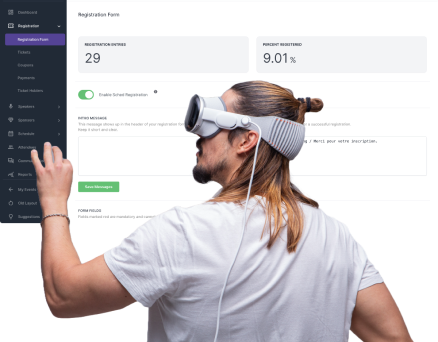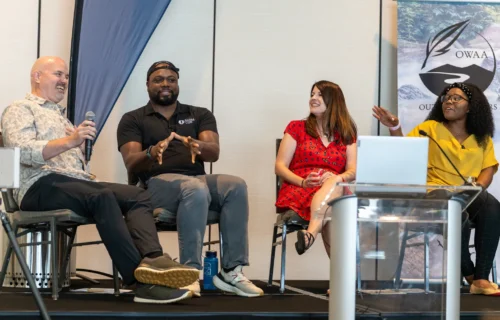When you’re putting time and budget into an event, getting people to show up is only half the battle. You also need them to engage, share it with others, and remember your brand long after it’s over.
Event marketing is how you get people excited before the event and keep the momentum going after it ends. This blog will teach you how to build a strong event marketing strategy in 2025, including what channels to use, trends to watch, and how to make your event stand out in a crowded calendar.
Main Takeaways
Table of contents
- 1 Main Takeaways
- 2 What Is Event Marketing?
- 3 Why Is Event Marketing Important for Hybrid and In-Person Events
- 4 What Are the Different Types of Event Marketing
- 5 The Best Event Marketing Strategies for 2025
- 6 6 New Trends In Event Marketing
- 7 Try Sched For Free to Power Your Event Marketing and Promotion
- 8 FAQs
- Event marketing drives engagement before, during, and after your event. It helps increase attendance, create buzz, and keep your event top of mind for attendees.
- Strong marketing matters more than ever in 2025. With hybrid and in-person formats coming back in full force, your strategy needs to meet higher expectations for relevance and experience.
- Personalization wins attention. Use attendee data to tailor emails, landing pages, and messages so they feel more relevant and increase conversions.
- Showcase the experience, not just the logistics. Help people picture what your event will be like with speaker spotlights, behind-the-scenes previews, and real attendee stories.
- Start marketing early and keep momentum going. Open with a save-the-date or early bird offer, then follow up with regular updates to maintain excitement.
- Technology is your ally, not your enemy. Using event marketing software like Sched can help you market smarter, automate manual tasks, and deliver a better attendee experience.
What Is Event Marketing?
Event marketing is a strategic approach on how you promote an event to your target audience. That includes everything from social media campaigns and email invites to speaker spotlights, website content, and more. The goal is to raise awareness and create hype around an experience people want to be part of.
You might be marketing your own event or participating in someone else’s. Either way, event marketing is about reaching the right people and showing them why it’s important to them.
Why Is Event Marketing Important for Hybrid and In-Person Events
Great content and speakers don’t mean much if your audience doesn’t know about them. Event marketing plays an important role in connecting brands with their audiences. Event marketing helps you:
- Increase attendance by reaching people across different platforms.
- Build trust and brand awareness with new audiences.
- Drive engagement during the event through real-time interaction.
- Extend the value of your event by repurposing content post-event.
With hybrid and in-person events making a strong comeback this year, your marketing strategy needs to reflect what audiences expect now, and that’s flexibility, relevance, and a smooth experience throughout the event.
What Are the Different Types of Event Marketing
Your marketing approach may change depending on the type of event you’re hosting or promoting. Here are some common formats:
Conferences
Conferences are large-scale events focused on a specific industry or sector. They offer networking opportunities, keynote sessions, and panels. Businesses use conferences to exhibit their expertise and connect with potential clients.
Trade Shows
Trade shows bring together companies from a specific industry to showcase their products and services. These events are ideal for product launches and generating leads. They’re typically hosted in person with booths and exhibits.
Seminars & Workshops
Seminars are educational events focusing on a specific topic. They are typically shorter than conferences. These are great for marketing to niche audiences.
Webinars
Cost-effective and scalable, webinars help you educate and engage people virtually. This makes them perfect for lead generation and thought leadership.
Product Launches
These events are designed to introduce a new product to the market. Product launches generate buzz and excitement, offering demos or experiences of the product. Marketing here is all about storytelling, sneak peeks, and building as much anticipation as possible.
Hybrid Events
Hybrid events mix in-person and virtual experiences, giving attendees the option to participate however they prefer. They also help expand your reach beyond your location.
📚 Need inspiration for promoting a virtual event? Check out our Virtual Event Marketing Guide.
The Best Event Marketing Strategies for 2025
1. Personalize Your Campaigns
Use registration data, job titles, and past behavior to send relevant emails and tailor landing pages. People are more likely to sign up if the event feels made for them.
2. Preview The Experience
Giving attendees a session list might not be enough anymore. They want to know what the event will feel like and what they will get out of it. So use speaker quotes, behind-the-scenes footage, or visuals that show off your venue or platform.
3. Go Where Your Audience Is
If you’re targeting educators, post in LinkedIn groups and education newsletters. If you’re running a corporate or healthcare training, email your network and ask speakers to help promote.
Give speakers and partners pre-made graphics and blurbs they can share with their networks. The easier you make it for others to spread the word, the wider your reach.
5. Start Early, Then Build Momentum
Open registration with a save-the-date or early bird offer. From there, roll out new content like speaker spotlights, session previews, and testimonials to keep your audience engaged.
6 New Trends In Event Marketing
1. Hybrid Events
These blend in-person and virtual experiences, offering flexibility and increased accessibility. Attendees can join from anywhere, and that can help boost participation rates. You have the opportunity to offer multiple ways to engage depending on attendee preferences.
2. Experiential Marketing
These events focus on engaging all the senses and fostering emotional ties with the audience. Think interactive installations, hands-on demos, or themed environments that immerse attendees in your brand story. The goal is to create memorable moments people will talk about and share.
3. Gamification
Incorporating game elements in events enhances engagement. This trend turns passive participants into active players, making the event more interactive and enjoyable. You can use leaderboards, quizzes, scavenger hunts, or rewards to encourage participation and keep attendees motivated throughout the event.
4. Data-Driven Personalization
Use what you know about your attendees to shape the experience for them. When content feels personal, people are more likely to stay engaged, and share positive feedback. One way to do this is to consider your attendees’ interests and session behavior to make personalized recommendations on what sessions to attend.
5. Sustainable Practices
Eco-friendly initiatives, such as reducing waste and opting for green venues, resonate with today’s environmentally-conscious consumers. You can also use local vendors and offer reusable materials to minimize your event’s footprint and align with sustainability goals. Give it a try at your next event.
6. Event Technology
Investing in advanced technology improves efficiency and interaction. Tools like mobile apps and virtual reality enrich the event experience for attendees.
Try Sched For Free to Power Your Event Marketing and Promotion
Sched helps you market and manage your event without any tech background.
You can use Sched’s event marketing software to:
- Build and update your event schedule with drag and drop tools
- Give attendees mobile access to everything they need
- Collect feedback and track attendance across sessions in seconds
- Save hours on communications, administrative work, and manual updates
Ready to make your next event easier to promote? Start your free trial today.
FAQs
What is event marketing, and how does it work?
Event marketing is the strategy of promoting a brand through events, either in-person, virtual, or hybrid. It works by creating engagement opportunities that generate leads, build trust, and increase visibility.
Why is event marketing important in 2025?
Event marketing helps you stand out in a crowded calendar by building pre-event excitement, driving attendance, and turning your event into a longer-lasting brand experience.
What’s the difference between hybrid and in-person event marketing strategies?
In-person strategies focus more on local promotion and on-site engagement, while hybrid event marketing includes online channels, virtual access, and post-event digital content to reach remote audiences.
How do you measure the success of your event marketing efforts?
Track metrics like registration numbers, attendance rate, email open and click-through (CTR) rates, social media engagement, and post-event feedback to evaluate performance.
What are the top event marketing trends for 2025?
Top trends include hybrid experiences, experiential marketing, gamification, personalized content, sustainable planning, and the use of advanced event tech like mobile apps and VR.









